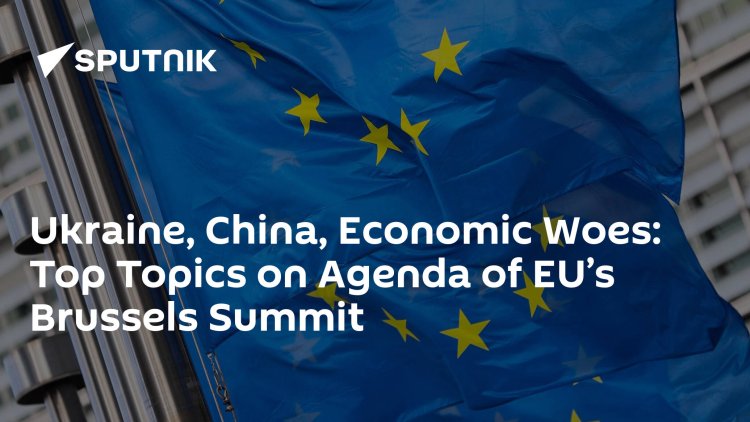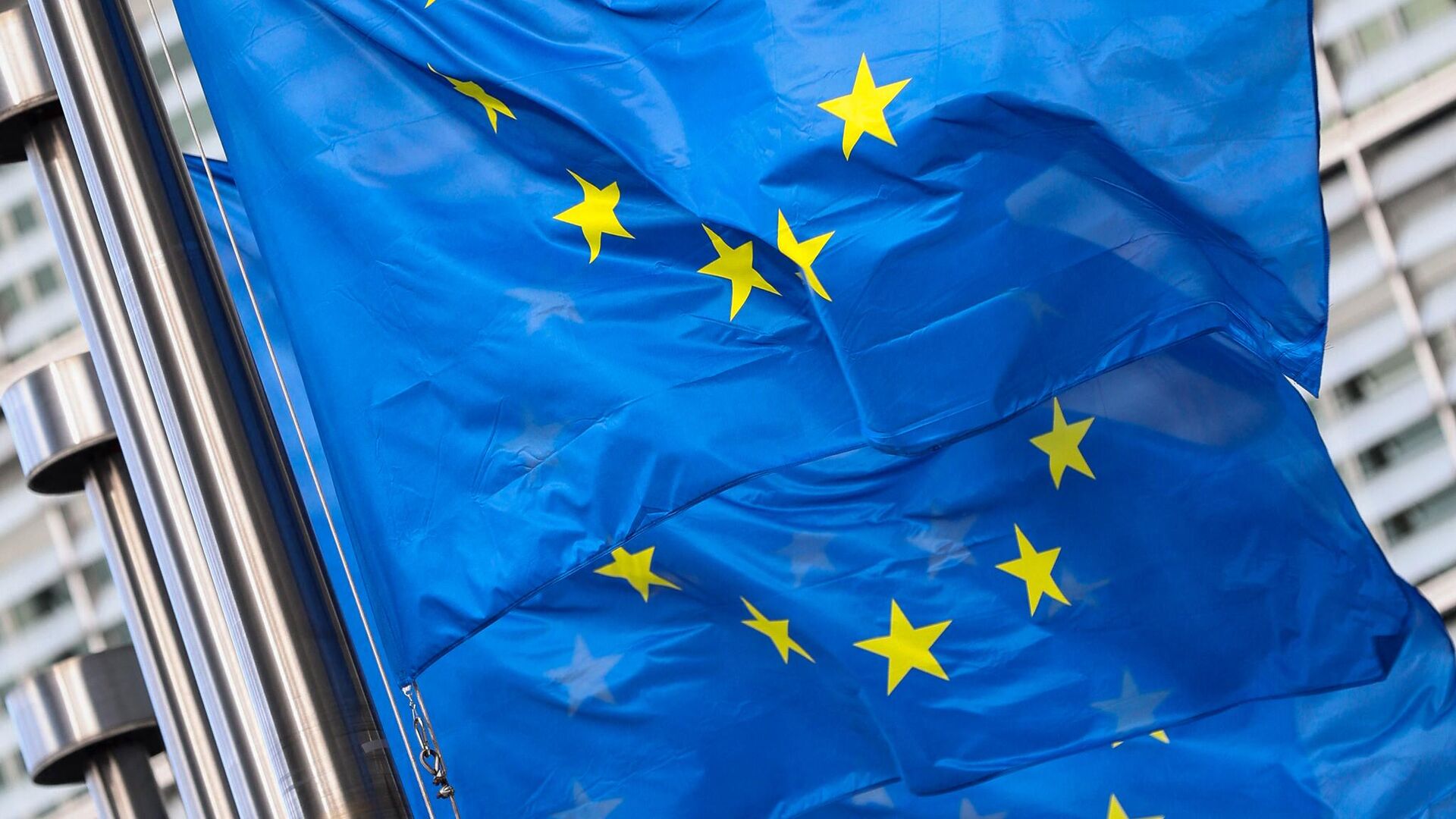European Union Summit Kicks Off in Brussels
© KENZO TRIBOUILLARDEuropean Commission © KENZO TRIBOUILLARDSubscribeInternationalIndiaAfricaIlya TsukanovAll materialsWrite to the authorThe meeting, taking place less than two weeks before the NATO alliance's summit in Vilnius next month, is expected to tackle many of the same issues, including the ongoing security crisis in Ukraine and purported Chinese "threats" to Europe.A two-day summit of the European Union kicked off in Brussels on Thursday, with leaders of the bloc's 27 member states coming together in the Belgian capital.The meeting, running from June 29-30, is expected to focus on issues including the Ukrainian conflict, the European bloc's economy, security, defense, migration, cooperation with NATO and increasingly tense ties with China.NATO Secretary General Jens Stoltenberg will be in attendance as officials prepare for the bloc's Vilnius summit in July, highlighting the ties between the Western economic and military blocs.Ukraine Tops Agenda AgainJust like last year's E


© KENZO TRIBOUILLARD
Subscribe
The meeting, taking place less than two weeks before the NATO alliance's summit in Vilnius next month, is expected to tackle many of the same issues, including the ongoing security crisis in Ukraine and purported Chinese "threats" to Europe.
A two-day summit of the European Union kicked off in Brussels on Thursday, with leaders of the bloc's 27 member states coming together in the Belgian capital.
The meeting, running from June 29-30, is expected to focus on issues including the Ukrainian conflict, the European bloc's economy, security, defense, migration, cooperation with NATO and increasingly tense ties with China.
NATO Secretary General Jens Stoltenberg will be in attendance as officials prepare for the bloc's Vilnius summit in July, highlighting the ties between the Western economic and military blocs.
Ukraine Tops Agenda Again
Just like last year's EU summit, the Thursday-Friday meeting's top focus is Ukraine. Kiev's centrality to the agenda makes sense, from Brussels' perspective, given the bloc's decades-long push to pull the Eastern European nation into the EU, and the enormous resources which have been funneled into propping Ukraine up economically and supporting it militarily amid the West's proxy war with Russia over the past year-and-a-half.
Ukrainian President Volodymyr Zelensky is expected to join EU leaders virtually to give them an "update" of the situation at the front, where Kiev's counteroffensive is showing signs of bogging down as Western officials push Ukraine to continue the hopeless assault against fortified Russian positions.
The summit comes in the wake of a review of a draft budget for the 2024-2027 period by the European Commission, and a request that member states increase the budget by 66 billion euros ($72 billion), mostly to fund additional assistance for Ukraine.
Since the onset of Russia’s special military operation, EU members have provided more than 61.7 billion euros in direct support to Kiev, including over ten billion euros in military assistance. Moscow has warned repeatedly that such aid threatens to escalate the crisis, and has pointed to reports that Western support is being pilfered or diverted to third countries, falling into the hands of criminal elements and rebel groups in conflicts around the world.
EU foreign affairs chief Josep Borrell stressed repeatedly in recent weeks that Brussels' Kiev client state would quickly collapse without Western support.
Economy
Economic matters are also high on the agenda this year, with the Council expected to discuss the "current economic outlook" following the 20-member Eurozone's slip into a recession earlier this year amid soaring energy prices - caused in part by the bloc's rejection of cheap and plentiful Russian energy. Russian officials have warned repeatedly that a rejection of Russian energy could leave the EU uncompetitive against global economic giants including the US and China, and expressed bewilderment at Brussels' readiness to undermine its own economic security to make a political point.
Thursday and Friday's discussions are expected to include providing bloc members "additional guidance in the areas of industrial policy, the Single Market and Europe's long-term competitiveness and productivity," according to the agenda. Brainstorming on "how to strengthen the Union's economic security and resilience by defending its interests while preserving an open economy" is also expected.
Guns Over Butter
The two-day meeting will include discussions on measures to bolster EU security and defense capacity, and the strengthening of "the technological and industrial base of the European defense sector." These talks, which come amid NATO's upcoming Vilnius summit, also come against the background of growing concerns about EU countries running out of weapons and ammunition, and amid record hikes in the military budgets of some member nations at the same time that social spending is being slashed.
China
The summit is also expected to include discussions on China, Brussels' other major competitor besides Russia. China proposed a comprehensive, 12-point peace plan in February, with the plan met favorably as a jumping off for talks by Russia, but dismissed by Kiev and its Western patrons as "irrational" and biased.
Some officials expect the EU to focus on growing economic "threats" posed by China, with discussions expected to include putting curbs on dual use technologies which could "enhance the military capacities of some countries of concern." Other sources said the bloc is hoping to at least outwardly soften its China policy so as not to "piss off" Beijing amid growing economic tensions.
Migration
The tricky topic of immigration is another major issue which will be brought up at Thursday and Friday's event, with EU leaders set to review the "migratory situation" in the bloc, and take note of recent updates in the bloc's migration and asylum policy, including measures taken to strengthen the EU's external borders.
Europe has faced a three-pronged immigration crisis over the past decade, mostly attributed to the West's global policy, with the NATO bombardment of Libya in 2011 and the CIA dirty war against Syria prompting millions of refugees, asylum seekers and economic migrants to make their way into Europe from Africa and the Middle East. The escalation of the Donbass crisis into a full-blown NATO-Russia proxy war in Ukraine last year exacerbated the problem, with over four million Ukrainian nationals settling in EU countries including Poland, Germany, the Czech Republic, Spain, Italy and France. A Brussels think tank calculated in December hosting Ukrainian refugees cost 43 billion euros in 2022 alone, placing huge strains on the bloc's social safety net.
What's Your Reaction?









![[World] 'I saw bodies dumped from lorry into mass grave'](https://www.9020blog.com/uploads/images/202307/image_650x433_64b15db2841ff.jpg)












